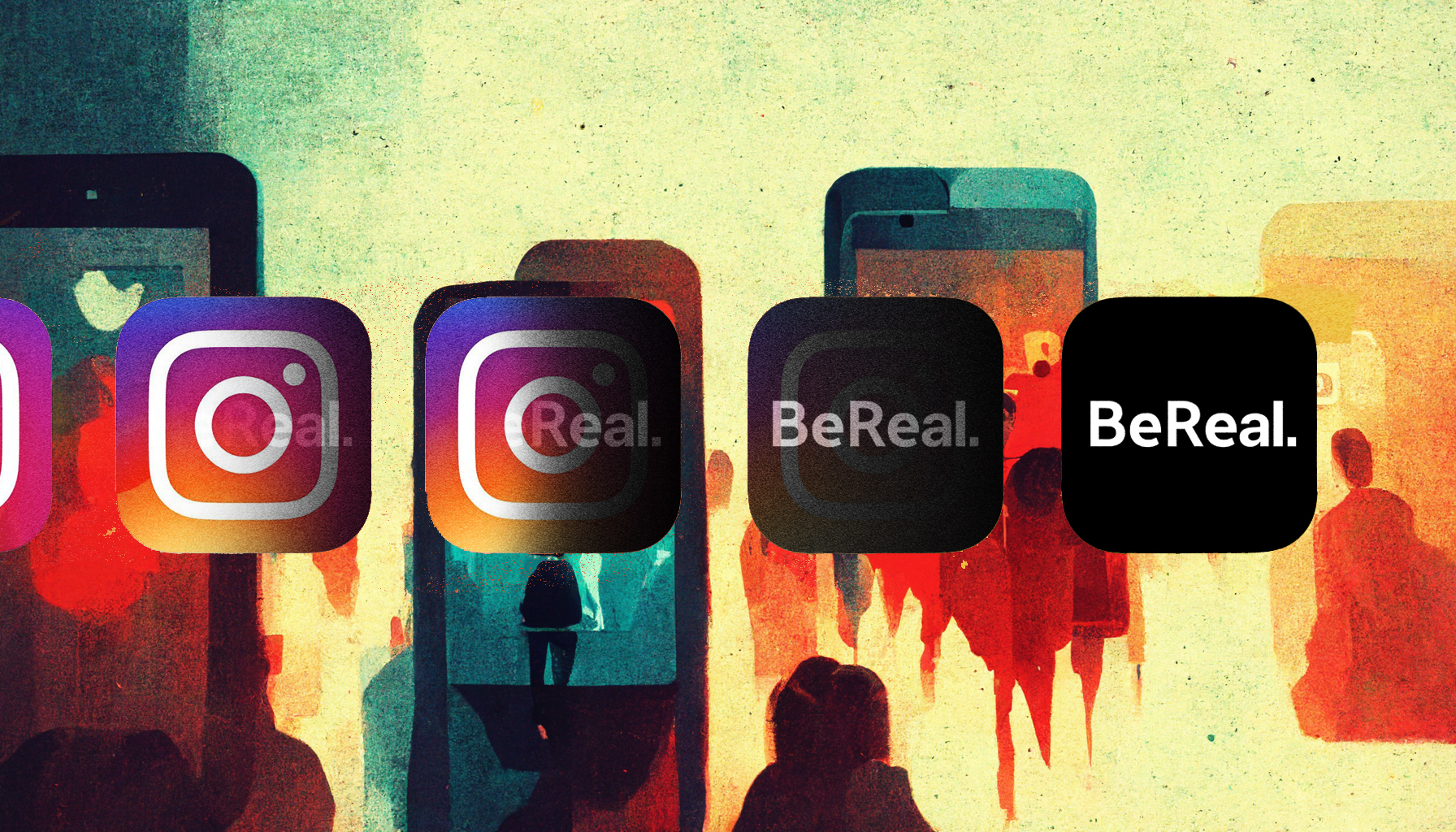In an age when what we publish online is so determinative of how we are perceived, it’s natural to make comparisons between ourselves and others. The way in which platforms such as Instagram can promote unrealistic body standards, eating disorders, depression, loneliness, and general misery is well-documented. Thanks to the innovation provided by people who grew up with Steve Jobs posters in their bedrooms, you can now feel inadequate about your achievements with LinkedIn, your fitness on Strava, and even your jokes on Twitter.
Enter BeReal: a social media platform that prompts users at different, randomly selected times of day to post an image taken from their phones’ front and back cameras simultaneously, which is then made visible to their friends. The app has been described as the “anti-Instagram”, supposedly cutting through the artifice of other social media to see your friends “for real”. It purports to offer the benefits of social networking without the associated insecurities and misery that can plague users of other platforms with their highly curated and polished content. This pitch has clearly worked, with the app’s popularity exploding in recent months, skyrocketing to number one on the App Store. When social media is such an integral component of modern life, the hope is that BeReal could prove a seismic change in such a controversial industry. In this regard, it proves to be a disappointment.
BeReal’s hypothesis is that it is the time taken to plan content which creates unrealistic standards online, and that by reducing that discrepancy through an artificial time constraint allows users to be more “real”. However, this fails to identify both the problem with social media and what the solution to that might be.
Some variation of “social media isn’t real” has been the title of many think-pieces in the last decade, which tends to misdiagnose why social media can be so damaging. After all, when you post your first photo on Instagram, knowing first-hand that you don’t usually look like that — that your life isn’t usually that exciting — you yourself know that you are participating in an illusory world. Your Instagram stories aren’t a movie of your life, they’re just the trailer.
Secondly, the ability to plan and polish content for social media isn’t the crux of the problem, in fact the opposite is true. Most people with the financial means to do so can go to a scenic spot, dress in nice clothes, take 50 pictures and choose the best one. For all its sins, traditional social media allows you to present your best self, something that you can feel proud of. It isn’t merely planning, but rather other factors which leads to people feeling inadequate on the internet. Wealth allows people to spend holidays in beautiful houses lying next to backyard pools, or to take European family vacations, or have the best seats at a sports game or concert. If someone is conventionally attractive, then they will still look good, even without filters and makeup! Having great friends can create what appear to be beautiful moments, from the Instagram Story of the surprise birthday party to cosy Wednesday night dinners. These factors permeate every aspect of someone’s social media, even their BeReal, because they are constitutive elements of a person’s life. Sure, BeReal will strike everyone when they are studying, watching TV, doing chores, or even crying — but this small concession is ultimately a pyrrhic victory.
When you see someone post a BeReal that makes you feel lonely, inadequate, ugly, or unloved, you can’t dismiss that as a romanticised version of their life, because according to BeReal, that’s the real thing. You don’t just have a worse social media presence than that person, you have a worse life.
The spontaneity of engaging in BeReal means, in theory, it doesn’t require the time and effort that is often invested into other forms of social media. Yet at the same time, knowing that any moment that everyone you know could see the world through your eyes creates pressure for you to engage in a constant performance to display your best qualities. Are you more selective with who you choose to spend time with, the risks you take, and the places you visit, when you are constantly waiting to be surveilled by everyone you know?
To be fair, BeReal can be fun. As one friend noted, BeReal is primarily focused on your friends, meaning it doesn’t present you with the algorithmic content seen on other platforms such as Instagram’s ‘Explore’ page, which can often be the most distressing to view. So, if something provides joy, use it! However, don’t be deluded, BeReal isn’t the “anti-Instagram”, if anything, it’s Instagram’s next evolution. Judging by how quickly Meta developed Instagram Reels to copy TikTok, don’t be surprised if the next thing you see on your Instagram is a notification telling you to “Be Reel”. If or when you do, try remembering that at the end of the day, it’s just, for better or worse, another social media website.





